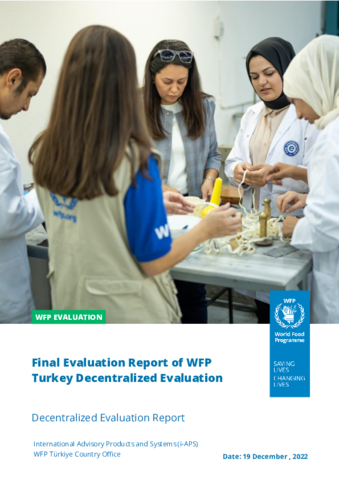
This decentralized evaluation (DE) was commissioned by the WFP Turkey Country Office and covers the Socio-economic Empowerment and Sustainability (SES) programme in Türkiye from July 2020 to February 2022. The SES programme uses a dual system of theoretical (vocational) and practical (applied) training. SES Programme covers 16 provinces in Türkiye. The Programme includes vocational training in areas of Store Attendant, Food Packaging, Information Technology, and Chief Assistant. The programme also includes institutional capacity building to ensure longer-term sustainability and the facilitation of public-private partnerships to enhance the quality and relevance of the training offered.
The evaluation’s objective was to assess the performance of the livelihood activities and identify lessons learned along with assessing the programme against the OECD DAC criteria of relevance, effectiveness, efficiency, impact, and sustainability. The evaluation results will be used to guide the implementation of the remaining project activities and will inform future projects in Türkiye. The evaluation served dual objectives of accountability and learning through identifying recommendations.
The Evaluation questions examined if the design of the livelihood project was relevant to the overall objectives and the extent to which those outcomes have been achieved. The evaluation also looked at the major factors influencing the achievement or non-achievement of project’s objectives and how effective and efficient was the programme in doing so. The questions also sought more clarifications on the primary and secondary impacts of the livelihood’s activities on the community and participant and if the outcomes are sustainable over time.
The SES program has demonstrated progress towards helping vulnerable refugees and Turkish citizens gain vocational skills and find employment. The programme has contributed to the creation of 398 jobs and has had a positive impact on beneficiaries’ household income. Also, the programme has made a positive contribution to social cohesion. The evaluation found that the programme is achieving results despite challenging conditions including high inflation, stagnant economic growth, and the COVID-19. The evaluation found that there are opportunities to further support WFP’s strategic objective of supporting vulnerable refugee and Turkish citizens to access labor market opportunities if greater accommodations are considered for women and individuals with disabilities.
Based on the evaluation findings, the evaluation made 10 recommendations:
-
Expediting partnerships with Chambers of Commerce and Industry
-
Expansion of İŞKUR’s role in matching beneficiaries with training and employment opportunities
-
Providing training on Turkish work regulations, norms, and expectations for beneficiaries
-
Expanding course offerings to be inclusive for people with disabilities
-
Providing employers with gender-sensitivity training
-
Promoting face-to-face interactions for beneficiaries to encourage social cohesion
-
Consider ways to monitor beneficiaries after graduation to assess the longer-term effects
-
Consider Ways to link beneficiaries with childcare services
-
Linking refugees and vulnerable Turkish citizens with vocational course offerings in high-demand sectors
-
Maximizing existing resources and networks of NGOs for recruitment and referrals
